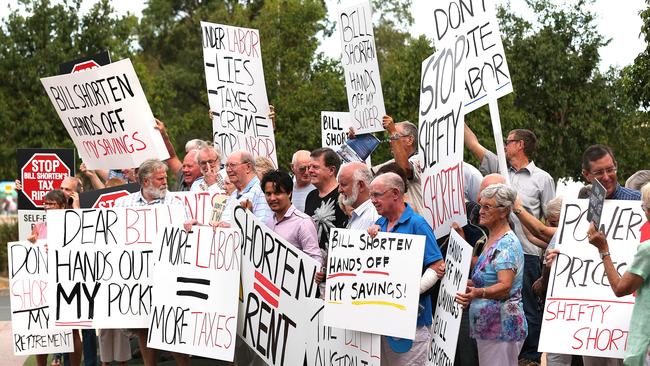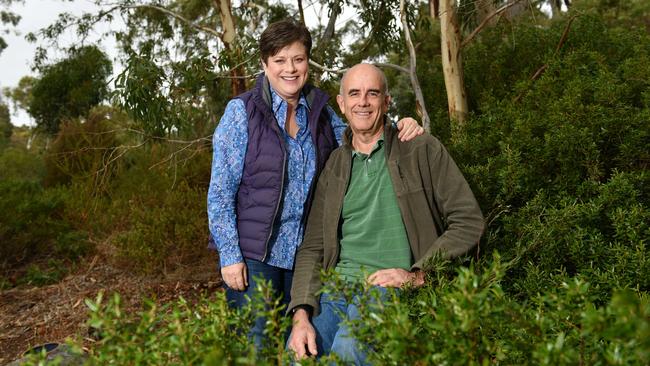Win or lose: your personal finance guide to the federal election
Personal finance and tax are Australia’s biggest federal election flashpoints for the first time in many years. SEE HOW IT AFFECTS YOU
Saver HQ
Don't miss out on the headlines from Saver HQ. Followed categories will be added to My News.
Personal finance and tax are Australia’s biggest federal election flashpoints for the first time in many years.
Plans by the Labor Party to crack down on negative gearing tax deductions, capital gains tax discounts and retirees’ franking credit cash refunds will hit the hip pockets of millions of people either directly or through potential side effects.
Self-funded retirees are fuming over Labor’s policy to axe cash refunds for excess franking credits from shares, which will cost many a huge chunk of their income — around $10,000 a year.
• Digital tax shake-up a win for Aussies
• Beware of scammers targeting seniors
Association of Independent Retirees acting president Wayne Strandquist said the changes would force self-funded retirees onto the pension, and cutting their income to fund other spending promises was not fair.
“Imagine if the Labor Party announced to union members that if elected, they will move to reduce their income by 10 per cent or more — the whole country would come to a standstill,” he said. “Imagine how workers on construction sites would respond.”

Labor remains the odds-on favourite to win this weekend’s election.
Financial strategist Theo Marinis said it was brave of Labor to stick to its tax increases, because things didn’t go so well for the Coalition in 1993 when it lost the “unlosable election” over the GST.
“Negative gearing has been a big Ponzi scheme, but the concern is that the property markets have already come off, so the timing won’t be fantastic,” he said.
Mr Marinis said the key message to investors was “don’t panic”.
“Just wait and see what happens,” he said.
Realestate.com.au chief economist Nerida Conisbee said weaker investor confidence had driven the current housing market downturn, and things were likely to get worse.

“The changes to negative gearing and capital gains tax will led to a further drop in house prices and also lead to a rise in rents,” she said. “The analysis is consistent.
“Renters are very sensitive to rent increases and I think they will really lose out.”
On the positive side, most workers will receive tax cuts worth hundreds of dollars a year — to be paid via a tax rebate when they file their tax return from July.
The Coalition’s steady-as-she-goes approach to personal finance for this poll contrasts with Labor’s long list of changes, including cutting some superannuation caps and removing flexibility around contributions.
Ian and Rebecca Peters, aged 58 and 55, are in superannuation savings mode but are more concerned about environmental policies than proposed tax and super changes.
“Whether you have 5 or 10 per cent more or less funds is less of an issue than whether the wheels are falling off society or whether you are destroying species at an alarming rate,” Mr Peters said.
BetaShares chief economist David Bassanese said election campaigns could be negative for the economy because of uncertainty, but there was often a “post-election bounce in sentiment”.
“In the main, elections tend to have short-term impacts on the economy and markets, so more often than not the best investor reaction is to maintain their current strategy,” he said.
ELECTION MONEY MOVES
1. TAX CUTS
Both parties have pledged tax cuts from July 1, in the form of rebates that will flow through your tax refund rather than a few dollars a week that can be frittered away easily.
2. RETIREE HIT
Self-funded retirees will potentially lose thousands of dollars a year as Labor abolishes cash refunds for unused franking credits from share dividends.
3. HEALTH INSURANCE
Labor wants to cap health insurance premium rise at 2 per cent annually for the next two years.
4. INVESTMENT TAXES
From January 1, negative gearing tax deductions will be limited to new property purchases only, while the 50 per cent capital gains tax discount for investment profits will be halved to 25 per cent if Labor wins. It argues these tax concessions are too generous.
5. REAL ESTATE
Property prices have been falling nationally and are tipped to fall further if the tax changes pass through parliament. Rents are forecast to rise as fewer investors focus on residential real estate.
6. WELFARE PAYMENTS
Labor leader Bill Shorten has hinted at a review into raising the Newstart Allowance.


